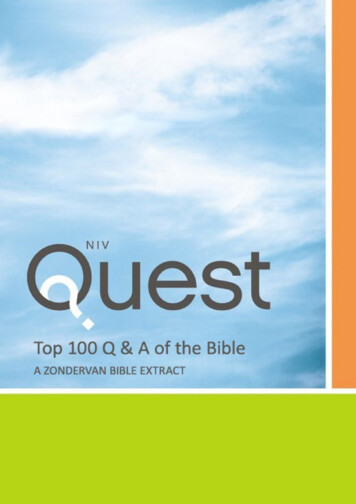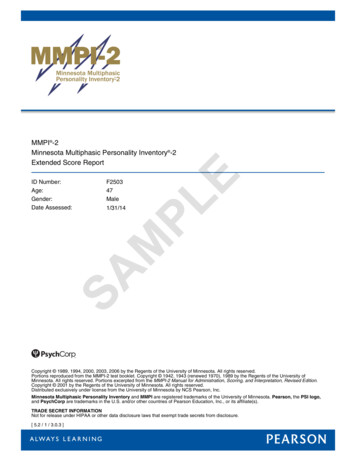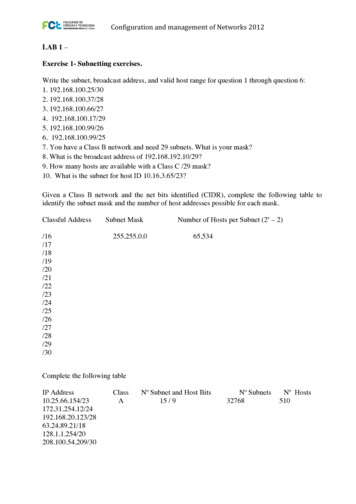
Transcription
2
Top 100 Q & A of the BibleA Zondervan Bible Extract3
Top 100 Q & A of the Bible: A Zondervan Bible ExtractCopyright 1994, 2003, 2011 by ZondervanGrand Rapids, Michigan 49530, USAwww.zondervan.comThe NIV Concordance copyright 1982, 1984 by Zondervan.Maps by International Mapping. Copyright 2009 by Zondervan. All rights reserved.“New International Version” and “NIV” are registered trademarks of Biblica, Inc. Used by permission.eISBN: 9780310411338The NIV text may be quoted in any form (written, visual, electronic or audio), up to and inclusive of five hundred (500) verses without the express writtenpermission of the publisher, providing the verses quoted do not amount to a complete book of the Bible nor do the verses quoted account for twenty-five percent(25%) or more of the total text of the work in which they are quoted.Notice of copyright must appear on the title or copyright page as follows:Scripture quotations taken from The Holy Bible, New International Version , NIV .Copyright 1973, 1978, 1984, 2011 by Biblica, Inc. Used by permission. All rights reserved worldwide.The “NIV” and “New International Version” are trademarks registered in the United States Patent and Trademark Office by Biblica, Inc. When quotations from the NIV text are used by a local church in non-saleable media such as church bulletins, orders of service, posters, overhead transparencies,or similar materials, a complete copyright notice is not required, but the initials (NIV ) must appear at the end of each quotation.Any commentary or other biblical reference work produced for commercial sale, that uses the NIV text must obtain written permission for use of the NIV text.Permission requests for commercial use within the USA and Canada that exceeds the above guidelines must be directed to and approved in writing by Zondervan,5300 Patterson Ave. SE, Grand Rapids, MI 49530, USA. www.Zondervan.comPermission requests for commercial use within the UK, EU and EFTA that exceeds the above guidelines must be directed to and approved in writing by Hodder&Stoughton Limited, 338 Euston Road, London NW1 3BH, United Kingdom. www.Hodder.co.ukPermission requests for non-commercial use that exceeds the above guidelines must be directed to and approved in writing by Biblica US, Inc., 1820 Jet StreamDrive, Colorado Springs, CO 80921, USA. www.Biblica.comAny Internet addresses (websites, blogs, etc.) and telephone numbers in this Bible are offered as a resource. They are not intended in any way to be or imply anendorsement by Zondervan, nor does Zondervan vouch for the content of these sites and numbers for the life of the Bible.All rights reserved.NT10910A portion of the purchase price of your NIV Bible is provided to Biblica so together we support the mission of Transforming Lives Through God’s Word.Biblica provides God’s Word to people through translation, publishing and Bible engagement in Africa, Asia Pacific, Europe, Latin America, Middle East, andNorth America. Through its worldwide reach, Biblica engages people with God’s Word so that their lives are transformed through a relationship with JesusChrist.4
CONTENTSHow to Use this Zondervan Bible ExtractIndex of the Top 100 QuestionsOther NIV Quest Study Bible eBooks5
HOW TO USE THIS ZONDERVAN BIBLE EXTRACTThank you for purchasing the Top 100 Q&A of the Bible: A Zondervan Bible Extract. Thisdigital extract from the NIV Quest Study Bible is designed to address the top 100 common,uncommon, and perplexing questions people ask about Scripture. While it does not containthe full Bible it does contain all the verses associated with the top 100 questions & answersBible reading plan.Each Top 100 question and its answer are indicated by aicon.A complete Index of the Top 100 Questions is also available.Included in some reference notes will be additional Scripture references. Use thesereferences with a complete Bible to dive deeper into Bible study.The NIV Quest Study Bible has clarified the meaning of the Scriptures for countlesspeople. This Zondervan Bible Extract will do the same for you.A complete Quest Study Bible, containing 7000 questions & answers is also available.We hope you enjoy reading the Top 100 Q & A of the Bible: A Quest Study Bible Extract.6
INDEX OF THE TOP 100 QUESTIONSGenesisAre these literal 24-hour days?Is “one man, one woman” the only kind of union God approves of?What are angels, and how do they interact with the world today?ExodusWho is God, what does he value, and how can we approach him?How do I balance concern for the poor with the needs of my family?Can our prayers cause God to change his mind?LeviticusHow are these laws relevant to us today?Is there anything wrong with same-sex relations?Are Christians required to tithe?DeuteronomyWhich is better, spiritually speaking—to be rich or poor?Does the Bible speak to the issue of immigration?Is there a connection between spiritual and physical health?Why does God allow bad things to happen?JoshuaWhat values does a Christian family hold?JudgesCan we determine God’s will by “putting out a fleece”?RuthWhich of the Bible’s instructions regarding male and female roles are specific to first-century culture?1 Kings7
Does it matter when and where we pray?2 ChroniclesCan the Bible exaggerate and still be true?EzraHow can we handle guilt and regret over our past decisions?NehemiahShould Christians today observe the Sabbath?JobAre people just pawns in God’s chess game?Is God responsible for Satan’s actions or people’s sins?How much does the Bible explain about the afterlife?If we are treated unfairly, is God still good?PsalmsWhy does it sometimes seem like God is far away?Why do our prayers seem ineffective at times?Does God send troubles?If I have a relationship with God, why do I feel so lonely?Why does God choose some people and reject others?Does anything prevent God from responding to our prayers?How does a person meditate on God’s Word?Is there any “secular” evidence to support the Bible’s claims?Is it wrong for Christians to use contraception?Does the Bible define when human life begins?Does God approve of war?ProverbsHow do I show love to people who violate God’s standards without endorsing their sin?How should children be disciplined?How can parents prepare their children to impact the world?Is it wrong for both parents to work outside of the home?Ecclesiastes8
How does God want us to save, spend and give our money?What is the best way to share our faith in the workplace?Song of SongsWhat does the Bible say about sex?IsaiahHow involved should Christians be in caring for the earth?What does the Bible definitively reveal about creation?JeremiahDoes God change his plans based on what we do?Has God revealed himself differently to different cultures and time periods?EzekielWhat does the Bible say about the dangers of pornography?MatthewHow can we understand the Trinity?What is hell like?How can I tell if I have too much “stuff”?How involved should the church be in politics?What does it mean to love my neighbor?MarkHow should Christians understand prayer?How can we, imperfect people, live the way Jesus wants us to live?Does the Bible approve of remarriage after divorce?Are natural disasters literally “acts of God”? Does he cause them?LukeWhat are demons, and how do they interact with the world today?Does saving for retirement show a lack of trust in God?Does God expect me to forgive someone who keeps hurting me?John9
Is there more to the gospel than being assured of heaven?Is accepting Jesus the only way for people to get to heaven?How can the Christian church become what Jesus intended?ActsWhat is the Holy Spirit’s role in evangelism?What about those who have never heard about Jesus?Does it matter which Bible translation Christians use?What is the value of baptism?RomansHow are we justified?Does sin ever quit?What determines a person’s eternal destination?1 CorinthiansDoes God expect me to keep my mind and body pure in today’s culture?How do Christians practice evangelism in a culture that frowns on “proselytizing”?What is my purpose in life? And how can I be certain of it?How can we identify our spiritual gifts?GalatiansIs there value in other religions like Islam, Buddhism and Hinduism?EphesiansAs a Christian, am I supposed to do good works?What does the Bible mean about wives submitting to their husbands?What is spiritual warfare, and how does it affect me?PhilippiansWhat can Christians do to become more like Jesus?ColossiansIn what ways should the church be serving the world?How can we gain victory over secret sins?10
1 ThessaloniansAre we tempted by Satan or by our own evil desires?What does it mean to be sanctified?1 TimothyShould women be prohibited from certain leadership roles within the church?How important is it that we understand all doctrines correctly?2 TimothyHow should Christians teach their children about God?Does the Bible have answers for all of today’s moral dilemmas?TitusDoes it matter which denomination my church belongs to?HebrewsHow do we know the Bible is true?Do Christians really need to attend church?What does it mean to have faith?JamesIn what ways can people experience God today?Should we regularly confess our sins to other Christians?1 PeterHow much influence does Satan have in the world today?2 PeterWhat do we know about a new heaven and a new earth?Why are so many parts of the Bible difficult to understand?1 JohnWhat happens to a Christian between death and the day of judgment?11
RevelationWhat is heaven like?Does obedience bring prosperity?Can Christians lose their salvation?Does God give people a chance to believe in him after death?12
Are these literal 24-hour days? (Genesis 1:3–31)Regardless of whether the “days” of creation were figurative or literal 24-hourperiods, this passage is a truthful description of what took place. It indicates thatthere is intelligence, meaning and purpose behind all existence. In other words, theword of God directed the method of creation as well as the source of creation (Ps33:6, 9; Heb 11:3). Yet human beings have been given the privilege of exploring,through scientific investigation, how God may have engineered these events andhow long he took to do so.Many understand the six days of creation as representing long periods of timebecause the sun, which marks a 24-hour day, wasn’t created until the fourth day.And the word day is used in chapters 1–2 in three distinct ways: (1) asapproximately 12 hours of daylight (Ge 1:5); (2) as 24 hours (1:14) and (3) as aperiod of time involving, at the very minimum, the whole creative activity from dayone to day seven (see 2:4, where the word that is translated when is the same wordthat is elsewhere translated day). The light (1:3) could not have come from theearth’s sun if the sun was not created until the fourth day. The light could havecome from other sources that God provided in the universe prior to the creation ofthe sun. We can only speculate about what the atmospheric conditions might havebeen at that time.3AndGod said, “Let there be light,” and there was light. 4God saw that the light wasgood, and he separated the light from the darkness. 5God called the light “day,” andthe darkness he called “night.” And there was evening, and there was morning—thefirst day.6AndGod said, “Let there be a vault between the waters to separate water from water.”God made the vault and separated the water under the vault from the waterabove it. And it was so. 8God called the vault “sky.” And there was evening, andthere was morning—the second day.7So9AndGod said, “Let the water under the sky be gathered to one place, and let dryground appear.” And it was so. 10God called the dry ground “land,” and the gatheredwaters he called “seas.” And God saw that it was good.11ThenGod said, “Let the land produce vegetation: seed-bearing plants and treeson the land that bear fruit with seed in it, according to their various kinds.” And itwas so. 12The land produced vegetation: plants bearing seed according to their kindsand trees bearing fruit with seed in it according to their kinds. And God saw that itwas good. 13And there was evening, and there was morning—the third day.14AndGod said, “Let there be lights in the vault of the sky to separate the day from the13
night, and let them serve as signs to mark sacred times, and days and years, 15and letthem be lights in the vault of the sky to give light on the earth.” And it was so. 16Godmade two great lights—the greater light to govern the day and the lesser light togovern the night. He also made the stars. 17God set them in the vault of the sky togive light on the earth, 18to govern the day and the night, and to separate light fromdarkness. And God saw that it was good. 19And there was evening, and there wasmorning—the fourth day.20AndGod said, “Let the water teem with living creatures, and let birds fly above theearth across the vault of the sky.” 21So God created the great creatures of the sea andevery living thing with which the water teems and that moves about in it, accordingto their kinds, and every winged bird according to its kind. And God saw that it wasgood. 22God blessed them and said, “Be fruitful and increase in number and fill thewater in the seas, and let the birds increase on the earth.” 23And there was evening,and there was morning—the fifth day.24AndGod said, “Let the land produce living creatures according to their kinds: thelivestock, the creatures that move along the ground, and the wild animals, eachaccording to its kind.” And it was so. 25God made the wild animals according totheir kinds, the livestock according to their kinds, and all the creatures that movealong the ground according to their kinds. And God saw that it was good.26ThenGod said, “Let us make mankind in our image, in our likeness, so that theymay rule over the fish in the sea and the birds in the sky, over the livestock and allthe wild animals,[1] and over all the creatures that move along the ground.”27SoGod created mankind in his own image,in the image of God he created them;male and female he created them.28Godblessed them and said to them, “Be fruitful and increase in number; fill theearth and subdue it. Rule over the fish in the sea and the birds in the sky and overevery living creature that moves on the ground.”29ThenGod said, “I give you every seed-bearing plant on the face of the wholeearth and every tree that has fruit with seed in it. They will be yours for food. 30Andto all the beasts of the earth and all the birds in the sky and all the creatures thatmove along the ground—everything that has the breath of life in it—I give everygreen plant for food.” And it was so.31Godsaw all that he had made, and it was very good. And there was evening, andthere was morning—the sixth day.14
Is “one man, one woman” the only kind of union God approves of? (Genesis2:24)In a word, yes. Here’s what Jesus said about marriage: At the beginning theCreator “made them male and female,” and said, “For this reason a man willleave his father and mother and be united to his wife, and the two will become oneflesh” (Mt 19:4–5).Scripture uses metaphorical language to describe marriage, picturing it in termsof a head and body. Ephesians 5:23 says, For the husband is the head of the wifeas Christ is the head of the church, his body, of which he is the Savior. Headshiphas to do with oneness. The wife is the body of the husband as the church is thebody of Christ (Col 1:18). The mystery of marriage is that the head (the husband)plus the body (the wife) equals one flesh.This head-body picture shows why God approves only of monogamous,heterosexual marriage: two heads (two men) do not equal one flesh, and twobodies (two women) do not equal one flesh. This is affirmed many times inScripture (e.g., Lev 18:22; 1Co 6:9–11). This picture also shows why polygamy iswrong: a head (one man) and two or more bodies (two or more wives) do notcomprise a union of one flesh. It is true that many people in Scripture practicedpolygamy—including Abraham, Jacob, David and Solomon—but thoserelationships ultimately produced many kinds of strife for each family. Andalthough God chose to bring some good out of those situations (e.g., the 12 tribesof Israel), the goodness of God’s original plan was not changed.Finally, this picture of one-flesh union does not mean that single people areincomplete or somehow worth less than married people. The metaphorical image ofone flesh is used in Scripture to identify the boundaries of marriage and highlightthe institution as a picture of our relationship with Christ. Indeed, Paul (who wasnot married) made it clear in 1 Corinthians 7:7–8 that marriage and singleness areboth gifts to be used in service to God.24Thatis why a man leaves his father and mother and is united to his wife, and they becomeone flesh.15
What are angels, and how do they interact with the world today? (Genesis28:12)Along with the creation of the physical world, God also fashioned and populated aspiritual realm we call heaven. Little is known about heaven, which is the placewhere God dwells, because it is beyond human observation. But the Bibleidentifies some of its inhabitants as cherubim, or “winged beings” (Ex 25:18–22;Eze 10:1–22); others as seraphim, or “burning ones” (Isa 6:2; Rev 4:6–8); andmany simply as messengers (Ge 16:7–11; Ex 23:20–24; Mt 1:20–24), from whichthe term “angel” is derived. Together, the whole company of angelic beings iscalled the multitudes of heaven or the heavenly host (1Ki 22:19; Lk 2:13).In the Bible, angels and humans interacted primarily when these spiritual beingsdelivered messages from God to his people. But sometimes God sent angels tointervene in human affairs. For example, God sent an angel to guide the Israelitesthrough the desert (Ex 23:20–23), provide food for Elijah (1Ki 19:5–8) andexecute his divine judgment against the people of Israel (2Sa 24:16–17). While theministry of angels occurred most specifically in supervising the redemptivehistory outlined in the Bible, angels also communicated God’s divine will directlyto individuals (Ac 10:3–5) and provided them with protection (Ac 12:11; 27:23).Throughout subsequent history many people have reported the presence of angelicbeings who have communicated specific messages from God or intervened inspecific situations. The mysterious and transcendent character of angels hassometimes nurtured cultic obsessions, but such worship is clearly contrary to theBible’s teaching (Col 2:18–19).12Hehad a dream in which he saw a stairway resting on the earth, with its top reaching toheaven, and the angels of God were ascending and descending on it.16
Who is God, what does he value, and how can we approach him? (Exodus3:13–14)The Bible doesn’t explain who God is or try to prove his divine existence. Itassumes God is eternally present (Ge 1:1) and depicts creation as a result of hisdivine thought and action (Ge 1:1–2:25). God has, however, offered us a glimpseof who he is through creation (Ps 19:1–6), his Word (Ps 18:30–31), and especiallythrough the incarnation of his Son, Jesus Christ, who is the radiance of God’sglory and the exact representation of his being (Heb 1:3). Jesus demonstratedGod’s compassion, grace and glory in his life, death and resurrection. From thisand from the empowering presence of the Holy Spirit at Pentecost (Ac 2:1–13),our awareness of God as Trinity (one God in three persons) was formed.While God’s being is beyond comprehension or perception (Ex 33:20; Jn 1:18),both the physical world and the human conscience clearly attest to his values andpurposes. In addition, God revealed what he values through the Sinai covenant(Ex 20:1–24:18). The Ten Commandments (Ex 20:2–17; Dt 5:6–21) wereaffirmed by Jesus as a faithful summary of God’s moral values (Mt 5:17–47), andthey continue to shape social values and legal systems today. God also revealedwhat he values through the dietary regulations (Lev 11:1–47) and worshipregulations (Lev 1:1–9:24; 16:1–34; 21:1–25:55) that were given to the ancientIsraelites. Those regulations emphasized God’s holiness and his desire for hispeople to be holy (Lev 11:44). When Jesus came to earth, he taught that whileactions are important, God is more concerned with the heart (Mt 5:17–47; 15:18–20). God desires that we love him, trust him, obey him and imitate his character inour interactions with others by being compassionate, loving and forgiving.So how can we approach such a holy God? Access to God is only through faith inJesus Christ (Jn 14:6; Ro 5:1–2; Eph 2:13–18; 3:12). Christ suffered once for sins,the righteous for the unrighteous, to bring [us] to God (1Pe 3:18). Let us thenapproach God’s throne of grace with confidence, so that we may receive mercy andfind grace to help us in our time of need (Heb 4:16).13Mosessaid to God, “Suppose I go to the Israelites and say to them, ‘The God of yourfathers has sent me to you,’ and they ask me, ‘What is his name?’ Then what shall I tellthem?”14Godsaid to Moses, “I AM WHO I AM.[1] This is what you are to say to the Israelites: ‘IAM has sent me to you.’ ”17
How do I balance concern for the poor with the needs of my family? (Exodus23:10–11)The poor mentioned in these verses are those who are in need of basic necessities(e.g., food, clothing, shelter). But elsewhere the Bible mentions other types ofpeople who are poor. Whereas Matthew recorded Jesus saying that the poor inspirit are blessed (Mt 5:3), Luke’s account states that the poor are blessed by God(Lk 6:20). The poor in spirit referred to in Matthew 5 are those who are spirituallybankrupt and desperate for God. The poor of Luke 6 are those who are desperatebecause they have no one to care for them. And the apostle Paul admonishedTimothy to care for the widows in his congregation, saying, Give properrecognition to those widows who are really in need (1Ti 5:3).The fundamental principle here is that God provides for the needs of the poor(Mt 6:25–34). But the question is, How does God do this? The answer is that hedoes this in a variety of ways. He often meets tangible needs through thegenerosity of his people, who want to give out of the abundance they have beengiven. And God is able to bless you abundantly, so that in all things at all times,having all that you need, you will abound in every good work (2Co 9:8).But God also assigns responsibilities to certain individuals who are close topeople with material needs. In 1 Timothy 5 Paul said that local needs ought to bemet by institutions and individuals who are in closest proximity to those in need.So in the case of widows, Paul said that children or grandchildren bear the firstline of responsibility to care for a widow’s material needs (1Ti 5:4). But if thewidow is all alone and remains upright in her loneliness, then she is to be cared forby the deacons (1Ti 5:5, 16). Give the people these instructions, so that no onemay be open to blame. Anyone who does not provide for their relatives, andespecially for their own household, has denied the faith and is worse than anunbeliever (1Ti 5:7–8).So how do we balance concern for the poor with the needs of our own family?There is no one-size-fits-all answer. We should begin by examining the stance ofour own heart in relation to the apostle’s admonition to the Corinthians: Whoeversows sparingly will also reap sparingly, and whoever sows generously will alsoreap generously. Each of you should give what you have decided in your heart togive, not reluctantly or under compulsion, for God loves a cheerful giver (2Co 9:6–7). God has given his people ample resources to supply every imaginable need.10“Forsix years you are to sow your fields and harvest the crops, 11but during the seventhyear let the land lie unplowed and unused. Then the poor among your people may get foodfrom it, and the wild animals may eat what is left. Do the same with your vineyard and yourolive grove.18
Can our prayers cause God to change his mind? (Exodus 32:14)Scripture teaches that God sometimes adjusts his plans in response to our actionsor requests. The Bible contains several examples of this: the Hebrews on theoutskirts of Canaan (Nu 14:11–23); Hezekiah’s repentance on behalf of Israel(Am 7:1–7) and the sparing of Nineveh (Jnh 3:1–10).Experiencing God’s will is dynamic. As with any interpersonal relationship,God’s relationship with humanity involves complex twists and turns. Godmodifies his responses based on ours, and we adjust our responses to God’s. So, ina sense, it can be said that God sometimes changes his mind in response to ourprayers.At the same time, God’s will is determined. There are decrees and promises hehas made that do not change. He kept his covenant with the forefathers of theIsraelites (Dt 7:7–8), and he keeps his new covenant with those who believe inJesus (Jn 6:37–40, 44). God wants us to live out his will obediently. He haspredetermined ways he expects us to respond, but he has made us capable ofresisting him (Ps 143:10; 1Th 5:16–18; Heb 10:35–39; 2Pe 3:9).These aspects of God’s will work together. While it is not possible for us to fullyunderstand how they work together, we know that God is ultimately in control.14Thenthe LORD relented and did not bring on his people the disaster he had threatened.19
How are these laws relevant to us today? (Leviticus 19:19–28)Though some of the laws in Leviticus seem readily applicable today, others donot. It can be unsettling to see a general principle (Love your neighbor, v. 18)alongside what seems to be a culture-specific rule (Do not cut the hair at the sidesof your head, v. 27). The result can be an apparent inconsistency in how we obeythese laws. For example, how can we continue to view homosexual intercourse assin (20:13) if we no longer care about blended fabrics of cotton and wool (19:19)?People attempt to resolve this problem in different ways. Some believe the lawsfit into different categories of behavior: moral laws are still binding, butceremonial and civil laws were superseded when Jesus came. The distinctionbetween a moral, civil and ceremonial law is not always clear, however. Othersbelieve that only those laws mentioned or repeated in the New Testament remainbinding.We can gain some insight into the problem by seeing what Jesus said about thelaw. He told his disciples that not a single letter of the law would disappear untileverything is accomplished (Mt 5:17–20). Yet because Jesus followed the truespirit of the law rather than the legalistic views of the religious teachers, he wasaccused of violating the law (Lk 6:1–2).Because the Bible is God’s Word, we may assume that each law expresses someaspect or enduring principle of God’s revealed will. Some details, writtenspecifically for Israel’s situation, will not fit ours today. But many of theregulating principles behind them are timeless. Matthew 5 provides severalexamples where Jesus upheld the deeper, spiritual principles of the law.The relevance of Old Testament laws may elude our understanding today becausethe content often addressed Israel’s particular call to be God’s distinct people.However, by seeking the timeless principle behind the letter of the law, we can stillapply God’s standards to the details of our lives within the context of our culture.19“‘Keep my decrees.“ ‘Do not mate different kinds of animals.“ ‘Do not plant your field with two kinds of seed.“ ‘Do not wear clothing woven of two kinds of material.20“‘If a man sleeps with a female slave who is promised to another man but who has notbeen ransomed or given her freedom, there must be due punishment.[1] Yet they are not tobe put to death, because she had not been freed. 21The man, however, must bring a ram tothe entrance to the tent of meeting for a guilt offering to the LORD. 22With the ram of theguilt offering the priest is to make atonement for him before the LORD for the sin he hascommitted, and his sin will be forgiven.20
23“‘When you enter the land and plant any kind of fruit tree, regard its fruit as forbidden.For three years you are to consider it forbidden[3]; it must not be eaten. 24In the fourthyear all its fruit will be holy, an offering of praise to the LORD. 25But in the fifth year youmay eat its fruit. In this way your harvest will be increased. I am the LORD your God.[2]26“‘Do not eat any meat with the blood still in it.“ ‘Do not practice divination or seek omens.27“‘Do not cut the hair at the sides of your head or clip off the edges of your beard.28“‘Do not cut your bodies for the dead or put tattoo marks on yourselves. I am theLORD.21
Is there anything wrong with same-sex relations? (Leviticus 20:13)Humankind’s fall into sin has pushed us away from God and his good purposesfor our lives. As a result, our desires and passions have become distorted anddisoriented in numerous ways. The very beginning of the Bible presents God’svision for human sexual relationships, and it describes that relationship as beingbetween a male and a female in the covenant of marriage (Ge 2:24). Although theBible contains only a handful of references to same-sex relations, all of them arenegative. In other words, engaging in same-sex relations is one way that we canfall away from God’s good vision for humanity.Perhaps the clearest reference to same-sex relations is found in Romans 1:18–32,which begins by describing humankind’s universal sinfulness in refusing toacknowledge God as the good creator and rightful ruler of our lives (Ro 1:18–20).This passage continues by listing numerous symptoms of our sinfulness. Engagingin homosexual relations is held up as one symptom of our fallen nature; but lestwe be tempted to judge such behavior, the list also includes sins such as gossiping,coveting and disrespecting parents. All of these sins are signs that we are brokencreatures in need of Christ’s healing.Furthermore, the Bible openly acknowledges that some early followers of Jesushad been practicing homosexuals (1Co 6:9–11). Bu
Bible reading plan. Each Top 100 question and its answer are indicated by a icon. A complete Index of the Top 100 Questions is also available. Included in some reference notes will be addit










